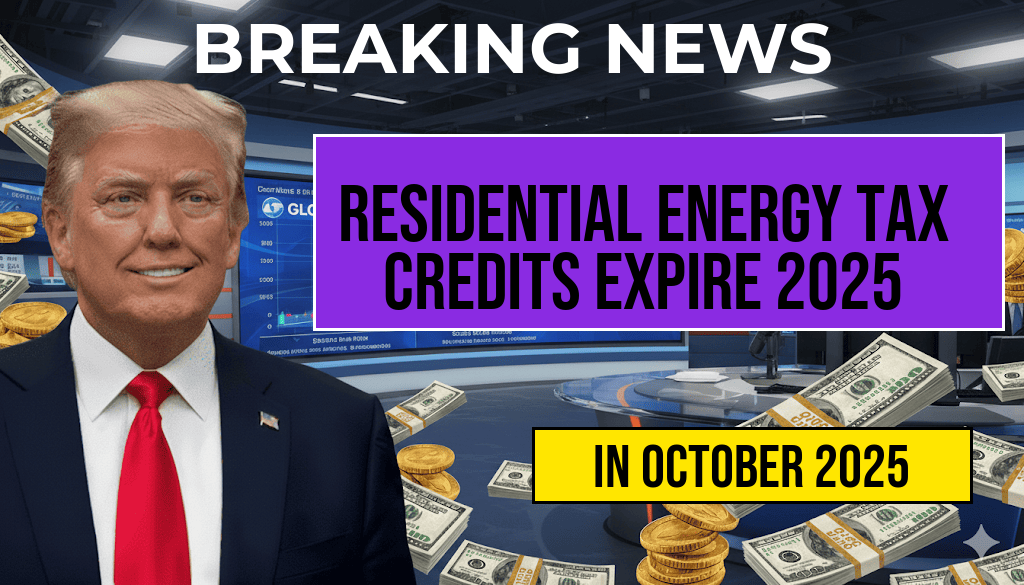The upcoming expiration of residential energy tax credits at the end of 2025 has raised concerns amongst homeowners, environmental advocates, and energy experts alike. Initially introduced to promote renewable energy adoption, these credits have significantly influenced consumer decisions regarding solar panels, energy-efficient appliances, and home improvements aimed at reducing carbon footprints. As the deadline approaches, many are left wondering how this will impact the green energy landscape in the United States, particularly in a time when transitioning to sustainable energy sources is more critical than ever. This article explores the implications of the impending expiration of these tax incentives, potential alternatives, and the future of residential energy initiatives.
Understanding Residential Energy Tax Credits
Residential energy tax credits offer homeowners a financial incentive to invest in energy-efficient systems and renewable energy technologies. These credits typically allow taxpayers to deduct a percentage of the cost of qualified energy improvements from their federal taxes. Some of the most popular credits include:
- Solar Investment Tax Credit (ITC): This allows homeowners to deduct 26% of the cost of solar panel installations from their federal taxes.
- Energy Efficient Home Improvement Credit: This provides a credit for various energy-saving home improvements, such as windows, doors, and insulation.
- Residential Renewable Energy Tax Credit: This credit extends to various renewable energy technologies, including wind energy systems and geothermal heat pumps.
These incentives have been crucial in making renewable energy technologies more accessible to the average consumer, allowing them to offset the initial costs associated with these investments.
Impact of the Expiration on Homeowners
The expiration of these tax credits is expected to have a considerable impact on homeowners considering renewable energy investments. With the credits set to decline and potentially vanish, many consumers may hesitate to make energy-efficient upgrades. The uncertainty surrounding future incentives could lead to a slowdown in the adoption of green technologies.
For instance, the Forbes Advisor notes that the ITC has played a pivotal role in driving solar installations across the nation. If homeowners are unable to claim significant tax breaks, the return on investment for solar systems may become less attractive, potentially stalling progress in reducing carbon emissions.
Alternative Incentives and Future Prospects
While the expiration of these tax credits presents challenges, there may be alternative incentives on the horizon. Various states and local governments are developing their own programs to encourage energy efficiency and renewable energy adoption. These initiatives may include:
- State Tax Credits: Some states have their own tax incentives that may continue to support residential energy improvements.
- Rebates and Grants: Utility companies and state programs sometimes offer rebates for energy-efficient upgrades.
- Low-Interest Loans: Certain financial programs provide low-interest loans for homeowners looking to invest in energy-efficient technologies.
Homeowners should stay informed about local programs that may offset the loss of federal incentives. Engaging with local energy-efficient organizations can provide additional resources and information about potential savings.
The Role of Policy Changes
The future of residential energy tax credits will largely depend on policy decisions at both state and federal levels. Advocates for renewable energy are pushing for legislative measures to extend or expand these credits beyond 2025. According to the Wikipedia page on tax credits in the U.S., a concerted effort from both consumers and politicians is necessary to ensure that green energy initiatives remain financially viable.
As the deadline approaches, organizations dedicated to climate change and energy efficiency are mobilizing to raise awareness about the importance of these tax credits. They argue that extending these incentives is vital not only for homeowners but also for the broader goal of reducing greenhouse gas emissions.
Conclusion: A Call for Action
The expiration of residential energy tax credits after 2025 could mark a significant turning point in the adoption of green energy technologies. Homeowners must act decisively by exploring available incentives and advocating for policies that support sustainable energy initiatives. As the demand for renewable energy grows, so does the necessity for financial incentives that make these technologies accessible to everyone. The next few years will be crucial in determining whether the momentum gained in the renewable energy sector will continue or face significant setbacks.
Frequently Asked Questions
What are Residential Energy Tax Credits?
Residential Energy Tax Credits are incentives provided by the federal government to encourage homeowners to invest in green energy solutions such as solar panels, energy-efficient windows, and heating systems. These credits can significantly reduce the overall cost of these installations, making them more accessible to homeowners.
When will the current energy tax credits expire?
The current Residential Energy Tax Credits are set to expire after the year 2025. Homeowners looking to take advantage of these incentives should act before this deadline to ensure they receive the benefits.
What types of energy-efficient improvements qualify for these tax credits?
Eligible improvements include a variety of green energy installations, such as solar energy systems, geothermal heat pumps, wind turbines, and energy-efficient upgrades to heating and cooling systems, insulation, and windows.
Are there any changes expected to the tax credit program before it expires?
How can I claim the Residential Energy Tax Credits?
To claim the Residential Energy Tax Credits, homeowners must complete the appropriate forms when filing their federal tax returns. This typically involves including Form 5695, which details the qualifying improvements and the amount of credit being claimed.

Leave a Reply